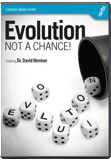
Biblical Faith is Not “Blind”—It’s Supported by Good Science
The word “science” is used in many ways. Many secular humanists try to redefine science as “naturalism”—the belief that nature is “all there is.”
Dear Ken
As a committed Christian you have to accept that the miracles recorded in the Bible are literally true. If such is the case then you have to accept that science is a complete misconception of the way the Universe functions.
This is not the case. The word “science” is used in many ways. Many secular humanists try to redefine science as “naturalism”—the belief that nature is “all there is.” In other words, by attempting to equate “science” (knowledge) with “naturalism” (a secular belief) they exclude the possibility of miracles before they even examine the evidence. But normal (operational) science deals only with repeatable observable processes in the present, while origins science helps us to make educated guesses about origins in the past. Since the Bible has demonstrated itself to be accurate time and time again, we have knowledge from history that miracles have indeed occurred.
Naturalism is not science; rather, naturalism is a fallacious philosophical bias. In fact, naturalism is actually incompatible with science as will be shown below. However, the miracles in Scripture are fully compatible with true science.
Science presumes that the Universe is ordered and follows rational physical laws which can be determined by man.
This idea actually comes from the Bible. Think about it like this: why is the universe ordered and why does it follow rational laws? The answer is that there is a Creator; God is logical and has imposed order on the universe. The universe obeys laws because there is a Law-giver. And why should it be possible for these laws to be discovered by man? The answer is that God has given us that ability; God created our mind—we are in His image. In fact, the Bible encourages us to gain understanding and wisdom (Proverbs 4:5, 4:7).
My prayer is that my comments will encourage and bring Praise and Honor to God. Your WHOLE ministry is such a God-send ( I mean that literally!) I appreciate every single part of it. Actually, I could go on and on about your exciting, meaningful, and much needed ministry.
It’s so exciting thinking about all the avenues you reach that I feel like I’m going to burst.:-) I hope before I die, that I’ll be able to visit and take a tour. Please know that I will remember you all and the ministry in my prayers.
THANK YOU! THANK YOU! for getting back to the basics (plus, plus, plus. :-))
Sincerely,
Sharon Swan
USA
However, if naturalism were true—if nature is “all there is”—then why should the universe have such order? If the universe were merely an accident, the result of a “big bang” as most naturalists believe, then why should it obey rational physical laws? Why would there be laws if there is no law-giver? And why should our brains (supposedly the product of random mutations and natural selection) be able to understand the universe? Why should one accident be able to understand another? The idea of naturalism is therefore incompatible with science. Only the Bible gives the proper foundation for scientific inquiry.
This would obviously not be the case if miracles occur. Scientific laws are supposed to hold true for every circumstance, this is why they are termed laws.
Not so. The ideal gas law does not work in certain instances. Newton’s laws of gravity and motion do not hold true near the surface of a black hole. These laws are approximations of the way nature works and do not apply in all circumstances. It would be better to say that the laws of nature (as formulated by man) are descriptions (with varying degrees of accuracy) of the way God normally upholds the universe today.
However; miracles run counter to the laws of physics this is why they are miracles. Miracles contradict physical laws hence the laws of physics do not hold true for all circumstances so are therefore wrong!
If God is capable of creating the universe and establishing laws of nature, would He not also be able to suspend those laws on occasion for special purposes? It is irrational to think that God could create the universe but then would have no power over it.
But, if we start from the Bible, the universe makes sense. God sustains the universe in a logical orderly way that can be described mathematically. But God is all-powerful and can suspend the laws of nature when He wishes.
To summarize: God can do what He wants; He’s God! Therefore, miracles are possible. But God normally upholds the universe in a consistent and orderly way that humans are capable of describing mathematically. Therefore, science is possible.
For example the Law of Conservation of Matter which states that matter can neither be created nor destroyed except by nuclear reaction must obviously be incorrect as illustrated by the feeding of the five thousand. Here a good deal of matter was created from nothing with no large energy inputs or emissions. (This would also negate E = MC2).
Actually, the laws of conservation only make sense if we accept the Bible. Why is it that no new mass or energy can come into existence? It is because God has made all things (John 1:3) and ended His work of creation by the seventh day (Genesis 2:2). Why is it that mass and energy do not simply cease to exist? This is because God sustains the universe by His Word (Hebrews 1:3) and by Him all things consist (Colossians 1:17).
In a sense, the law of conservation of mass and energy is merely a “scientific” summary of Genesis 2:2, John 1:3, Hebrews 1:3 and Colossians 1:17. Without the Bible, there is no basis for the law of conservation of mass and energy!
But God can suspend this law since He created it. Possibly this is what happened when Jesus fed the 5,000. During the Creation Week, it is a good thing that God did create new material from nothing—otherwise we wouldn’t be here to discuss it! Incidentally, God’s creating something from nothing does not actually violate E=mc2 since this equation quantifies the amount of energy associated with a given amount of mass; it is not a restatement of the conservation of mass or energy. (Of course, God could suspend E=mc2 if He wanted to.)
(By the way, nuclear reactions do not actually destroy matter, but merely convert one element into another, such as the fusion of hydrogen into helium in the core of the sun. Mass and energy are conserved in such a reaction.)
The turning of water into wine would indicate either that elements are not stable and can be transmuted without the expenditure of energy; for this act produced complex organic chemicals from H2O and I dont recall anybody complaining that the wine was hot or that matter can be created without the expenditure of energy.
A God who can create the entire universe (in 6 days!) could certainly do something as trivial as turning water into wine.
Walking on water certainly negates the idea of uniform acceleration due to gravity and also, the concept of floatation due to relative density is rendered absurd.
Some insects walk on water using surface tension; this does not negate gravity. Of course, the Lord can suspend/alter/supersede these laws at His will. The laws of nature were made by God and serve Him; He is not bound by them as we are.
Referring to an earlier time, the parting of the Red Sea would render a great many scientific laws totally defunct as would staying the passage of the Sun in its course or turning a staff into a snake. There are many, many miraculous events in the Bible all of which negate scientifically derived laws
Not true, the scientific laws are not negated, simply superseded by the One who created them, but they continued to be operational after every miracle. So your argument that the scientific laws are negated by miracles is without warrant.
(Not to mention scientific theories and hypotheses) and therefore render the pursuit of science a nonsense.
The Bible is actually the foundation for science. That’s not to say that non-Christians can’t do science; they can. But in order to do so, they must borrow biblical ideas (such as an orderly universe that obeys laws). Without the supernatural, there is no basis for logical, orderly laws of nature.
My point is:- You can accept the Bible on faith (as you are supposed to) or you can accept that we live in a world where physical laws are a constant. You cannot do both.
Biblical
faith is not “blind”—it’s supported by good science. The Bible teaches both that there are laws of nature (“ordinances of heaven and Earth
“—Jeremiah 33:25) and that miracles happen, such as the resurrection of Christ. The
idea that science goes against the Bible is therefore not a biblical concept.
So we can accept the Bible on faith and a world where physical laws are a
constant.
Either E=MC2 or it doesnt;
It does because God wills it. Of course, God could suspend this if He chose to do so.
either there is a constant gravitational force or there isnt and so on and so forth. Or, to put it another way, you either believe what the Bible states or you dont.
And where does the Bible say that science is not compatible with faith in God? It does not state that anywhere.
If you do then pursue faith if you dont then pursue science. You cannot do both as they run counter to each other.
This is not true and it is not biblical. Many great scientists have had faith in the Bible. Think of Isaac Newton, Johannes Kepler, James Clerk Maxwell and many others.
Why is it that you think that science and faith “run counter to each other”? My suspicion is that you may have bought into the secular humanist’s claim that science is the same as naturalism. There are many false things that are often presented as science, such as (particles-to-people) evolution, the big bang and billions of years. But such beliefs are not consistent with good science, as we have shown in our many resources. Science has confirmed many of the teachings of the Bible. Genetics shows how animals reproduce after their kinds; fossils and rocks show evidence of the worldwide Flood; 14C in diamonds shows the world is “young”; and many others as well.
Regards B.C., Australia
P.S. I believe you taught my daughter when you were teaching yr 8at State High.
I hope this is helpful.
– Dr. Jason Lisle, AiG–USA (on behalf of Ken Ham and AiG)
Recommended Resources

Answers in Genesis is an apologetics ministry, dedicated to helping Christians defend their faith and proclaim the good news of Jesus Christ.
- Customer Service 800.778.3390
- © 2024 Answers in Genesis







